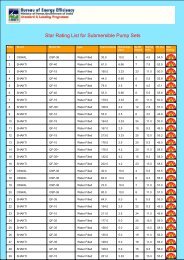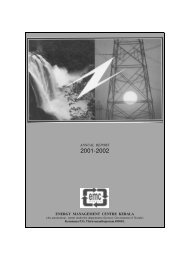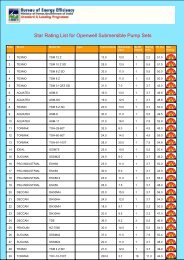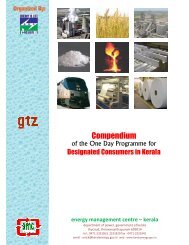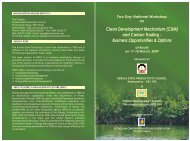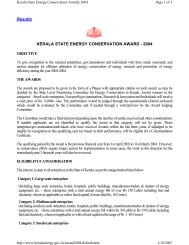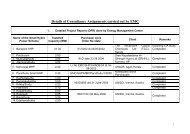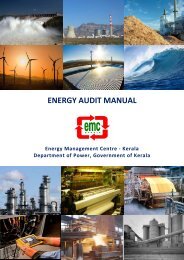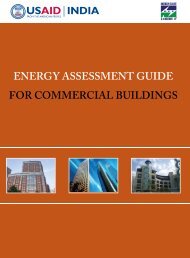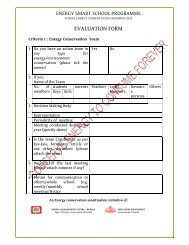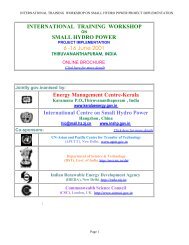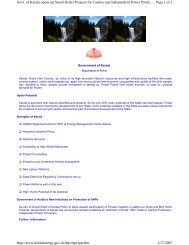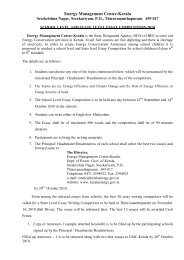Business and Policy Development - Energy Management Centre ...
Business and Policy Development - Energy Management Centre ...
Business and Policy Development - Energy Management Centre ...
Create successful ePaper yourself
Turn your PDF publications into a flip-book with our unique Google optimized e-Paper software.
Draft Highlights of<br />
Two-day Workshop on<br />
<strong>Energy</strong> Conservation Building Code - <strong>Business</strong> <strong>and</strong> <strong>Policy</strong> <strong>Development</strong><br />
29, 30 June 2010<br />
<strong>Energy</strong> <strong>Management</strong> <strong>Centre</strong>- Kerala (EMC)<br />
Department of Power, Government of Kerala<br />
Environment <strong>Management</strong> Agency Kerala<br />
Department of Environment, Government of Kerala
Preamble<br />
The programme was designed to transform behavior by educating <strong>and</strong> motivating the<br />
professionals involved in building transactions to alter their course toward improved energy<br />
efficiency in buildings through <strong>Energy</strong> Conservation Building Code (ECBC).<br />
Further to detail discussions between Environment <strong>Management</strong> Agency Kerala <strong>and</strong> <strong>Energy</strong><br />
<strong>Management</strong> <strong>Centre</strong> regarding <strong>Energy</strong> Conservation Building Code (ECBC) during January<br />
to June 2010, as part of implementing <strong>Energy</strong> Conservation Building Code in Kerala State,<br />
<strong>Energy</strong> <strong>Management</strong> <strong>Centre</strong>- Kerala (EMC) & Environment <strong>Management</strong> Agency Kerala<br />
(EMAK) jointly organized a two day Workshop on <strong>Energy</strong> Conservation Building Code<br />
<strong>Business</strong> <strong>and</strong> <strong>Policy</strong> <strong>Development</strong> at Thiruvananthapuram for <strong>Policy</strong> makers <strong>and</strong> Design<br />
engineers <strong>and</strong> execution agency representatives in the State.<br />
Kerala has the third highest overall population density of 819 persons per sq.km. (next only<br />
to west Bengal <strong>and</strong> Bihar) in 2001. But the density pattern in our major cities <strong>and</strong> towns<br />
shows that, the increase in density is due to the overall population increase over the entire<br />
spread of Kerala, which is occasionally accentuated in the urban areas with nominal<br />
variations. Urbanisation trend in the state of Kerala shows marked peculiarities.<br />
In Kerala, total commercial sectoral energy sales is 1900 MU which is about 15.7% of<br />
gross electricity sales in the State <strong>and</strong> consumption of 45 energy intensive Commercial<br />
Buildings amounts to 506 MU.<br />
Different Categories of Commercial Buildings
<strong>Energy</strong> saving potential in commercial category is about 20% with the growth of commercial<br />
sector the quanta of savings are bound to increase further.<br />
EMC has already identified buildings as a potential area for energy efficiency improvement<br />
<strong>and</strong> the first workshop on ECBC was held in 2007 <strong>and</strong> the second in 2010 intended to<br />
implement ECBC with the inputs from the various stakeholders. Prior to the programme a<br />
copy of ECBC was send to all the implementing agencies to equip <strong>and</strong> orient with the ECBC<br />
compliance matrix.<br />
Background<br />
The <strong>Energy</strong> Conservation Act 2001 (Central Act 52 of 2001) empowers the Central<br />
Government under section 14 (p) read with Section 56(2)(1) to prescribe <strong>Energy</strong><br />
Conservation Building Code(ECBC). The Code defines norms <strong>and</strong> st<strong>and</strong>ards for the energy<br />
performance of building <strong>and</strong> their components based on the climate zone in which they are<br />
located. ECBC provides minimum requirements for energy – efficient design <strong>and</strong><br />
construction of buildings. ECBC covers building envelope, heating, ventilation, <strong>and</strong> air<br />
conditioning system, interior <strong>and</strong> exterior lighting system, service hot water, electrical power<br />
system <strong>and</strong> motors.<br />
Chapter VI of the EC Act 2001 in Section 15 (a) provides the State Government to amend<br />
the energy conservation building codes to suit the regional <strong>and</strong> local climatic conditions <strong>and</strong><br />
may , by rules made by it, specify <strong>and</strong> notify energy conservation building codes with<br />
respect to use of energy in the buildings. It also allows the state government to direct every<br />
owner or occupier of a building or building complex being a designated consumer to comply<br />
with the provisions of the ECBC. Section 15 (b) of the EC Act also gives powers to direct<br />
every owner or occupier of a building or building complex being a designated consumer to<br />
comply with the provisions of <strong>Energy</strong> Conservation Building Code.<br />
Date <strong>and</strong> Venue of programme<br />
• 29th & 30th June 2010: Government Guest House, Thycaud, Thiruvananthapuram<br />
Inauguration of Workshop<br />
The Workshop inauguration was held on 29 th June 2010 at Government Guest House,<br />
Thycaud, Thiruvananthapuram. Mr. Dharesan Unnithan, Director, EMC gave the welcome<br />
speech in which he briefed <strong>and</strong> spoke on necessity of <strong>Energy</strong> Conservation Building Code.<br />
The session was presided by Dr S. K. Kh<strong>and</strong>uri, IFS, Director, EMAK <strong>and</strong> emphasized on
the necessity of ECBC. Mr. Paul Antony, IAS, Principal Secretary, Power Department,<br />
Government of Kerala formally inaugurated the programme <strong>and</strong> Mr. A. M. Narayanan,<br />
Head <strong>Energy</strong> Efficiency Division, EMC proposed vote of thanks.<br />
Faculty <strong>and</strong> resource support<br />
The programme faculties <strong>and</strong> resource support professionals comprised of the following:<br />
Mr. Narayanan A M, EMC<br />
Mr. Fahid Rahim, Saint Gobain Glass India<br />
Mr. An<strong>and</strong>, CII<br />
Mr. Steve Belkin, Sunflower Solutions<br />
Mr. R. Harikumar, EMC<br />
Mr. Vivek Jain, Philips Electronics India Ltd<br />
Mr. Rajeev R V, Schneider Electric India Pvt. Ltd.<br />
Mr. Sivakishan, TERI<br />
Mr. Salim, TCS<br />
Mr. Shivakumar & Mr. Shanavaz, KSPC<br />
Ms. S Kumar Deepa, EMC<br />
Mr. Johnson Daniel, EMC<br />
Mr. Subash Babu, EMC<br />
Mr. S<strong>and</strong>eep T R, EMC<br />
Mr. S<strong>and</strong>eep K, EMC<br />
Mr. Viju P M, EMC
Summary of interactive deliberations<br />
Mr. A.M. Narayanan, EMC<br />
The presentation spoke on all the aspects of ECBC, from its relevance to the various<br />
criteria as well as the compliance checking options. The entire presentation covered a gist<br />
of ECBC, providing a glance to the participants of all the sessions that were to follow. The<br />
session as it was meant provided the right mood <strong>and</strong> spirit to the participants. The building<br />
envelope, the heating ventilation <strong>and</strong> air conditioning, the electric power systems, lighting<br />
systems with respect to the compliance matrix were deliberated in detail.<br />
Mr. Fahid Rahim, Saint Gobain Glass India<br />
The presentation touched upon the contents of ECBC with respect to fenestration<br />
<strong>and</strong> spoke on the m<strong>and</strong>atory requirements explaining the terms such as Wall to Window<br />
ratio, the Solar Heat gain, the U factor as well as the whole body performance method,<br />
prescriptive method <strong>and</strong> trade-off method in the ECBC. He spoke on glass as a fenestration<br />
material its scope as well as the solution Saint Gobain as a company will be able to provide.<br />
Mr. An<strong>and</strong>, CII<br />
The Indian Green Building Council Rating systems <strong>and</strong> minute intricacies of the<br />
same were introduced. The presentation covered every aspect which a building comprises<br />
of <strong>and</strong> also the requirements <strong>and</strong> benefits of such a rating system. The major areas in IGBC<br />
rating are Sustainable Sites, Water efficiency, <strong>Energy</strong> <strong>and</strong> Atmosphere, Materials <strong>and</strong><br />
Resources, Indoor Environmental quality <strong>and</strong> Innovation <strong>and</strong> Accredited Professional<br />
points. There is a varying weightage for each of these six points are given for rating from<br />
IGBC.<br />
Mr. Steve Belkin, Sunflower Solutions<br />
The increase in efficiency in roof top systems solar photovoltaic systems with<br />
tracking systems with emphasis to manual tracking system which is more user friendly was<br />
discussed. It was also explained that the manual tracking system is less expensive at the<br />
same time very easy to use as well. The tracking system was reported to increase the<br />
efficiency of the system by 30-40 %.
Mr. R. Harikumar, EMC<br />
The Indian Scenario as applicable to the building sector on renewable energy <strong>and</strong><br />
the government policies <strong>and</strong> programme towards the various renewable options viz. solar<br />
thermal, wind solar hybrid <strong>and</strong> biogas were explained.<br />
Mr. Vivek Jain, Philips Electronics India Ltd<br />
The session covered the various aspects of illumination systems such as Lighting<br />
Controls, Space Control, Control in day lighted areas, Exterior Lighting Control, Additional<br />
Control for Display/Accent Lighting, Case Lighting, Hotel <strong>and</strong> Motel Guest Room Lighting,<br />
Task Lighting, Non Visual Lighting, Demonstration Lighting, Interior Lighting Power, Building<br />
Area Method <strong>and</strong> Space Function Method were discussed. The session was focused on<br />
<strong>Energy</strong> Conservation Building Code, with a through explanation not only the retrofits but<br />
also the illumination system as a science.<br />
Mr. Rajeev R V, Schneider Electric India Pvt. Ltd.<br />
The various aspects of Building <strong>Management</strong> System <strong>and</strong> their relevance on ECBC<br />
were detailed. The systems that come under the subtitle of electrical power in ECBC were<br />
well covered in the session.<br />
Mr. Sivakishan, The <strong>Energy</strong> & Resource Institute<br />
GRIHA, an acronym for Green Rating for Integrated Habitat Assessment, is the<br />
National Rating System of India. It has been conceived by TERI <strong>and</strong> developed jointly with<br />
the Ministry of New <strong>and</strong> Renewable <strong>Energy</strong>, Government of India. It is a green building<br />
'design evaluation system', <strong>and</strong> is suitable for all kinds of buildings in different climatic<br />
zones of the country. The session covered indepth aspects of (GRIHA) rating.<br />
Walk through of a Green Building - Peepul Park, Tata Consultancy Limited (TCS),<br />
Technopark, Thiruvananthapuram - Mr. Salim, AGM, TCS.<br />
On the second day of the workshop, the participants were taken to TCS, Peepul<br />
Park, Technopark, Thiruvananthapuram for site visit <strong>and</strong> further discussions. Mr. Salim,
TCS gave a brief idea about the TCS facility, LEED star rating in buildings, regarding their<br />
“Silver rated” building <strong>and</strong> procedures <strong>and</strong> criterion for attaining LEED rating for buildings.<br />
After the presentation, the participants were taken for a comprehensive walk through of the<br />
“Silver rated” building to show them the design & practices.<br />
Mr. Shiva kumar & Mr. Shanavaz, Kerala State Productivity Council<br />
The session covered the various aspects of <strong>Energy</strong> Audit with a focus on <strong>Energy</strong><br />
Conservation Building Code (ECBC). The session took the crowd towards the compliance<br />
matrix in a manner sufficient to orient the group into ECBC compliance check &<br />
implementation. The session covered energy audit case studies in detail.<br />
Break-out session<br />
After the interactive sessions, the participants were divided into six groups for group<br />
discussion. Mr. A M Narayanan, Head of <strong>Energy</strong> Efficiency Division, EMC briefed the<br />
participants on the session. After the group discussions, each group came up with<br />
recommendations/ inferences on how to implement <strong>Energy</strong> Conservation Building Code in<br />
the State. Each group leader presented their inferences. The session had Mr S K Kh<strong>and</strong>uri,<br />
IFS, Director, Environment <strong>Management</strong> Agency Kerala <strong>and</strong> Mr Shivakumar, Director,<br />
Kerala State Productivity Council as panelist.<br />
Salient points emerged from the break-out sessions<br />
The major points brought up in the brain storming of breakout sessions are listed down<br />
below group wise.<br />
Group 1<br />
1. Buildings with contract dem<strong>and</strong> greater than 600 kVA are part of the ECBC limit.<br />
However considering the large numbers of building are coming up in the range of<br />
100-200kVA contract dem<strong>and</strong> in Kerala, all HT <strong>and</strong> EHT building consumers may be<br />
brought under ECBC.<br />
2. Monitoring Committee
Yearly compliance audit to be done by a third party assessor <strong>and</strong> not the<br />
agency who gives building permit or certification such as the local self<br />
government agency or Electrical Inspectorate.<br />
3. ECBC Implementation Phases<br />
Phase 1: Intensive awareness campaign for all building sector professionals ie;<br />
all stakeholders in ECBC<br />
Phase 2: Voluntary Implementation for 1 year in <strong>Energy</strong> Intensive Buildings ( ie;<br />
buildings with more than or equal to 500kW connected load or 600kVA<br />
contract dem<strong>and</strong>) <strong>and</strong> to be made m<strong>and</strong>atory from the second year<br />
Phase 3: Voluntary implementation for 5 years for all commercial buildings<br />
(other than the energy intensive buildings mentioned above) <strong>and</strong> to be<br />
made m<strong>and</strong>atory from the sixth year onwards.<br />
4. Incentives & subsidy to be introduced during the voluntary implementation phase.<br />
5. If existing Buildings are made into ECBC complaint subsidies & incentives should be<br />
allowed.<br />
6. St<strong>and</strong>ardization of basic energy efficiency requirements in electrical equipments<br />
such as St<strong>and</strong>ards <strong>and</strong> Labeling Programme of Bureau of <strong>Energy</strong> Efficiency<br />
7. Training <strong>and</strong> certification of concerned officials of Local self government Institutions<br />
(LSGI) involved <strong>and</strong> responsible for building scheme in ECBC compliance<br />
verification. Training <strong>and</strong> certification may be preferably conducted by the State<br />
Designated Agency (SDA).<br />
Group 2<br />
1. ECBC code may be implemented as such. Any modifications required may be<br />
treated in a case to case basis.<br />
2. During the compliance all electrical systems may be inspected by Electrical<br />
Inspectorate; <strong>and</strong> all other aspects including building envelope by the Chief Town<br />
Planner/ District Town Planner. Inspection report should be filed to the SDA with a<br />
copy to the LSGI.
LSGI should scrutinize these compliance reports <strong>and</strong> attach with their pre<br />
commission/ commission approval. A copy of the compliance reports by these<br />
agencies may also be forwarded to the SDA.<br />
Group 3<br />
1. Training <strong>and</strong> certification of concerned officials of Local self government Institutions<br />
(LSGI) involved <strong>and</strong> responsible for building scheme verification <strong>and</strong> approval shall<br />
be conducted preferably by the State Designated Agency (SDA) under the Bureau of<br />
<strong>Energy</strong> Efficiency.<br />
2. A similar code for the residential building segment may also be taken up<br />
subsequently.<br />
3. Embodied energy assessment & material used in the construction also should be<br />
taken into account.<br />
Group 4<br />
1. The ECBC may be reviewed further with respective to the geoclimatic conditions in<br />
the various regions in the state.<br />
2. The applicant may send the building scheme with ECBC compliance matrix to the<br />
building verification <strong>and</strong> approval authority with a copy to EMC. Approving authority’s<br />
trained personal may confirm the compliance or furnish deficiency report if any for<br />
resubmission. EMC will also undertake compliance verification <strong>and</strong> preparation of<br />
report. EMC will forward its report/approval to the applicant as well as to the<br />
approving authority. EMC will provide compliance certificate to the approving<br />
authority with a copy to the owner within a period of one month. In the wake of no<br />
deficiency in the compliance matrix provided by the applicant, EMC will provide<br />
compliance certificate to approving authority with a copy to the building owner.<br />
3. Necessary inclusion may be made in Kerala Building Rule regarding ECBC.<br />
4. Compliance Auditing shall be done in 3 stages<br />
Scheme Submission - Preliminary stage<br />
Compliance Check - Intermediately stage<br />
Building Construction - Execution stage
5. Training <strong>and</strong> certification of concerned officials of Local self government Institutions<br />
(LSGI) involved <strong>and</strong> responsible for building scheme verification <strong>and</strong> approval shall<br />
be conducted preferably by the State Designated Agency (SDA) under the Bureau of<br />
<strong>Energy</strong> Efficiency ie; <strong>Energy</strong> <strong>Management</strong> <strong>Centre</strong> in case of Kerala.<br />
Group 5<br />
1. Local climate variations should be accounted in ECBC. There may be multiple zones<br />
in Kerala like coastal, plateau <strong>and</strong> high range.<br />
2. Due consideration shall be made for local traders <strong>and</strong> locally available materials<br />
while undertaking ECBC compliance check.<br />
3. Regional local committee shall be constituted with stakeholders of Govt. like LSGI,<br />
TP, PWD, KSEB, Electrical Inspectorate, EMC etc. for periodical review.<br />
4. Green building concept may be incorporated in Building rules.<br />
5. Use of energy intensive materials to be discouraged.<br />
6. <strong>Energy</strong> Performance Index in terms of units per square meter may be benchmarked<br />
for small. Medium <strong>and</strong> even large buildings <strong>and</strong> incentives based on the same may<br />
be proposed / given.<br />
7. The benchmark of 500kW shall be brought down to 100kVA contract dem<strong>and</strong> in<br />
Kerala.<br />
8. ECBC complaint materials may be included in the Government material schedule.<br />
Group 6<br />
1. ECBC Compliance: Modifications to be made<br />
Due considerations for climate of Kerala<br />
Check to be in place at the design stage rather than large scale retrofit at<br />
later phase.<br />
2. All buildings above 1000m 2 /10000sqft built-up area to m<strong>and</strong>atorily follow ECBC<br />
without connected load consideration.<br />
3. Tax rebate/incentives to be given to motivate.<br />
4. Initiative to implement in government buildings.
5. All developments below 1000m 2 to be taken up for energy conservation on voluntary<br />
basis with tax rebates & incentives. Prioritize requirements & give incentives that<br />
consider such applicants.<br />
6. Architects to ensure that basic planning comply with energy & environment friendly<br />
design.<br />
7. For buildings up to 1000m 2 KBR to be amended for ECBC compliance <strong>and</strong> approval<br />
check to be at local body level. For buildings above 1000m 2 approval from EMC to<br />
be m<strong>and</strong>atory. EMC to develop a core body competent to certify energy efficiency.<br />
8. Retrofit to be provided within a specified compliance period- phase out period.<br />
Penalty to be imposed, for exceeding time limit for compliance.<br />
Emerged Specific Recommendations & Way Forward<br />
The workshop was intended to be an eye opener to the fact that energy efficiency can be<br />
substantially improved with existing technologies. Also with an underst<strong>and</strong>ing that progress<br />
must be made well in time to vastly improve the energy efficiency of both new <strong>and</strong> existing<br />
buildings.<br />
The two day deliberations were intended to create awareness on the various aspects of ECBC<br />
compliance <strong>and</strong> also to equip the licensing <strong>and</strong> designing architects <strong>and</strong> engineers for the<br />
enforcement of the <strong>Energy</strong> Conservation Act, 2001. The Workshop as per the feedback of the<br />
participants enabled to develop a basic system wise underst<strong>and</strong>ing on ECBC <strong>and</strong> compliance<br />
matrix.<br />
The recommendations of the Workshop can be summarized as<br />
Implement ECBC in the State<br />
ECBC needs to be amended to include all HT Commercial Buildings<br />
ECBC compliance may be issued by LSGI in consultation with EMC. The compliance<br />
approval shall be within one month from the date of submission of the plan <strong>and</strong><br />
compliance matrix.<br />
Developing accredited professionals for ECBC compliance check in LSGs needs to be<br />
taken up by EMC; LSGIs may have budgetary provision to impart training <strong>and</strong> certifying
its concerned personnel.EMC shall train the existing building scheme verifying team for<br />
compliance check.<br />
A similar code for the residential building segment may also be taken up<br />
subsequently.<br />
In addition to the above recommendations the followings may also be included in the preview of<br />
the ECBC.<br />
Harnessing Renewable <strong>Energy</strong> for Electricity Generation in the building.<br />
<strong>Energy</strong> Efficiency of IT Hardware may also be included in the ECBC compliance check<br />
list.<br />
Kerala has been able to provide leadership in almost all aspects of sustainable development<br />
<strong>and</strong> building sector provides yet another means to improve the energy efficiency. The Kerala’s<br />
economy is also dependent of service industry such as IT industry, Hotel Industry, Hospitals etc.<br />
With more than 100 MU of identified savings (NPC Study in 2009) through retrofitting of existing<br />
buildings <strong>and</strong> an even higher from energy efficiency at design stage (which is exactly the aim of<br />
ECBC), the state can definitely pave its own path in the field.<br />
The programme enabled to encourage interdependence by adopting holistic, integrated<br />
approaches among the stakeholders that assure a shared responsibility <strong>and</strong> accountability<br />
toward improved energy performance in buildings <strong>and</strong> their communities.
Annexure<br />
The following are given as Annexure for reference <strong>and</strong> records:<br />
A. Program schedule<br />
B. List of Participants<br />
C. Photograph
Annexure A<br />
Program Schedule - Workshop on <strong>Energy</strong> Conservation Building Code <strong>Business</strong> <strong>and</strong> <strong>Policy</strong><br />
<strong>Development</strong> jointly organized by <strong>Energy</strong> <strong>Management</strong> <strong>Centre</strong>-Kerala & Environment<br />
<strong>Management</strong> <strong>Centre</strong>-Kerala<br />
DAY 1<br />
29 June 2010<br />
Registration 9.30 am – 10.00 am<br />
Session H<strong>and</strong>led by Time<br />
Morning Session 10.45 am - 1.00 pm<br />
Introducing ECEC<br />
Fenestration<br />
Green Building <strong>and</strong> LEED Certification<br />
Renewable <strong>Energy</strong> Application_ BIPV,<br />
Solar Roof tops systems<br />
Other Renewable <strong>Energy</strong> Application<br />
Mr. A. M. Narayanan, EMC<br />
Mr. Fahid Rahim, Saint Gobain Glass<br />
India<br />
Mr.An<strong>and</strong>, CII<br />
Mr. Steve Belkin,<br />
Sunflower Solutions, USA<br />
Mr. R. Harikumar, EMC<br />
Afternoon Session 2 pm - 5.15 pm<br />
Illumination System<br />
Electrical Power<br />
GRIHA Rating<br />
Mr.Vivek Jain, Philips<br />
Mr. Rajeev R V, Schneider Electric<br />
Mr. Sivakishan, TERI<br />
DAY 2<br />
30 June 2010<br />
Morning Session 10.00 am – 12.00 pm<br />
Session H<strong>and</strong>led by Time<br />
Site Visit <strong>and</strong> Discussions at TCS,<br />
Technopark, Triv<strong>and</strong>rum<br />
Mr. Salim, TCS<br />
<strong>Energy</strong> Audit in ECBC Perspective &<br />
Compliance<br />
Break Out Session <strong>and</strong> Group<br />
Presentation<br />
Afternoon Session 1.45 pm – 4.00 pm<br />
Mr. Shanavaz, KSPC<br />
Chair: Mr. A.M. Narayanan, EMC
Annexure B<br />
List of Participants for the Workshop<br />
SN Name Designation & Organization Telephone Email ID<br />
1 Ramesh R<br />
Assistant Executive<br />
Engineer, KSEB<br />
9447110750<br />
2 Sreekumar M B<br />
Executive Engineer,<br />
KSRTC<br />
3 Unnikrihnan Nair K<br />
Assistant Engineer,<br />
National Games<br />
9497570481<br />
Secretariat<br />
4 Haridas H V<br />
Team Head, National<br />
Games Secretariat<br />
0471-243000<br />
5 Raveendranath T C<br />
Superintendent Engineer,<br />
National Games<br />
9446568181<br />
Secretariat<br />
6 Priyalal J<br />
Assistant Executive<br />
josephpriyalal@yahoo.com<br />
9567364254<br />
Engineer, LSGD<br />
7 Dharmakeerthi P P<br />
Assistant Executive<br />
gopalppd@yahoo.co.in<br />
9447001127<br />
Engineer, LSGD<br />
Assistant Engineer,<br />
8 Ansar m<br />
National Games<br />
9446553310<br />
mkanzar@gmail.com<br />
Secretariat<br />
9 G Vijayakumar Director, Ajit Associates 999586874<br />
ajit@ajitassociates.com<br />
10 Dr. Salim A<br />
Professor & Head, Govt.<br />
Engg. College, Tvm<br />
9447119307<br />
profasalim@yahoo.co.in<br />
11 Renjith C<br />
Dy. Project Manager, CES,<br />
Triv<strong>and</strong>rum<br />
9847572147<br />
Renjithc_75@yahoo.com<br />
12 Sarikala D<br />
DPM, CES, Triv<strong>and</strong>rum<br />
9444170286<br />
cestriv<strong>and</strong>rum@yahoo.com<br />
13 Sasikumar T Executive Engineer, PWD<br />
8086395176,<br />
0487-2330010<br />
14 Sadan<strong>and</strong>a Pai Executive Engineer, PWD 8086395215<br />
15 Ch<strong>and</strong>rachoodan Executive Engineer, PWD 9447101819 gcp8888@gmail.com
Pillai<br />
16<br />
Manoj Kumar Manager (Admin-Ele), The<br />
Mahapatra<br />
Federal Bank Ltd.<br />
9847914490 manojmahapatra@federalbank.co.in<br />
17 Suma P Surendran<br />
Assistant Engineer, Kochi 9447127668,<br />
Municipal Corporation 0484-2369007<br />
18 Mohankumar M A<br />
PWO I, Kollam Municipal<br />
Corporation<br />
9446112813<br />
19 Ajayakumar P<br />
PWO I, Kollam Municipal<br />
Corporation<br />
9447334860<br />
20 Sarojadevi T O<br />
PWO I, Kollam Municipal<br />
Corporation<br />
9446256442<br />
21 Chinchu S<br />
PWO I, Kollam Municipal<br />
Corporation<br />
9847047161<br />
22 Jayakumar K<br />
PWO I, Kollam Municipal<br />
Corporation<br />
9349892031<br />
23 Unnilrishnan V EE (Planning), KSHB 9447048509<br />
24 Padmakumar R S AEE (Electrical), KSHB 9446144771<br />
25 Navakumar S R J<br />
Chief Engineer (BOT-<br />
Projects), KTDFC<br />
9446007571 srjnavakumar@gmail.com<br />
26 Anitha Selin A B<br />
Lecturer, Marian<br />
Engineering College<br />
9446750083 anithanavakumar@yahoo.com<br />
27 Salihan Assistant Engineer, LSGD 9446706816<br />
28 Bijimole E R Assistant Engineer, LSGD 9656372569 bijishanti@gmail.com<br />
29 Sherin Joseph<br />
Senior Architect, L&T<br />
9841075367,<br />
Global Engineering<br />
044-22433905<br />
Services<br />
sherin.joseph@Lnties.com<br />
30<br />
Senior Architect, L&T<br />
Mercy Star<br />
MERCY.PERIMALAM@LNTIES.CO<br />
Global Engineering 044-22337034<br />
Parimalam<br />
M<br />
Services<br />
31 Aparna Sathish<br />
Assistant Engineering<br />
9952016524,<br />
Manager, L&T Global<br />
044-22337027<br />
Engineering Services<br />
aparna.sathish@LNTies.com<br />
32 Shailaja S<br />
Senior Manager (Utilities),<br />
SFS<br />
9847741546 shailaja@sfstvm.com<br />
33 Radhamohan P K<br />
Secretary, Payyannur 04985-<br />
Municipality Corporation 2202067<br />
secpynr@gmail.com
34 Vinayan K P<br />
Secretary, Koothuparambu<br />
Municipality Corporation<br />
35 Radhakrishnan P<br />
Secretary, Thaliparambu 9447964037,<br />
Municipality Corporation 0460-2205340<br />
secthaliparamba@gmail.com<br />
36 Vijayakumar A<br />
Secretary, Varkala<br />
Municipality Corporation<br />
0470-2609358 secyvarkala@yahoo.com<br />
37 Liya E Assistant Engineer, LSGD 9447696866<br />
38 Indu R Chief Engineer, KSRTC 944707193<br />
39 Rajendra Babu K AEE, KSPCB 9446557504<br />
40 Anilkumar P S<br />
Assistant Professor, Govt.<br />
Engineering College, 9847302217<br />
Thrissur<br />
41 Sathish K Secretary, NGO TVM 0471-2435207<br />
42<br />
Dr. Venugopal Reddy<br />
S 9497758595<br />
43 Kannan K<br />
G M, Voltech Global<br />
Trading (P) Ltd, Chennai<br />
9566002303<br />
44 Rdhakrishnan P<br />
Advisor, Voltech Global<br />
Trading (P) Ltd, Chennai<br />
45<br />
Ch<strong>and</strong>ra Shekaran K<br />
G<br />
Consultant<br />
46 Sunilkumar B Lecturer, TKM College 9387313924 beesunil@gmail.com<br />
47 Bismi Mani AE, LSGD 9895830032 bismimani@gmail.com<br />
48 Shobana Kumari<br />
Assistant Executive<br />
Engineer, LSGD<br />
9447795388 Sobha.maniveena@gmail.com<br />
49 Rose Milan Daniel AE, LSGD 9497781492<br />
50 Elizabeth A Baby AE, LSGD 9496252395<br />
51 Joy Ashok AE, LSGD 9447961947<br />
52 Radhakrishnan Nair AE, LSGD 9446564113<br />
53 Ashraf Khan AE, LSGD 9387778886 khansetagon@yahoo.co.in<br />
54 Gopakumar V S AE, LSGD 9447245862<br />
55 Vinod M K AE, LSGD 9895192550 Vinod.m.krishnan@gmail.com<br />
56 Dileep M S<br />
Assistant Executive<br />
Engineer, LSGD<br />
9497568277
57 Antony M Vattoly AE, LSGD 9447577020<br />
58 Ajith Kumar G S<br />
Assistant Executive<br />
Engineer, LSGD<br />
9446968050<br />
59 Krishnankutty N BI, Corporation of Kochi 9995522616<br />
60 Arun T S<br />
0484-<br />
Public Relations Officer,<br />
2562020,<br />
High Court of Kerala<br />
9447090134<br />
khcpro@rediffmail.com<br />
61 Krishnamoorthy T A<br />
General Manager, KSIDC 9847064348,<br />
Ltd.<br />
0471-2318922<br />
krishnamoorthy@ksidc.com<br />
62 Padmakuar R D<br />
Deputy Chief (Projects),<br />
HUDCO Ltd.<br />
9446551260 rdpadma@gmail.com<br />
63 Beena Philipose DGM, HUDCO Ltd. 9446810860 beena.philipose@gmail.com<br />
64 Sudhamony S V<br />
Assistant Executive 9745180779,<br />
Engineer, KSEB<br />
0471-2514282<br />
65 Sreedevi R<br />
Assistant Executive<br />
Engineer, KSEB<br />
9495975238<br />
66 Rajeev Kumar K Executive Engineer, KSEB 9447124847<br />
67 Sheeja T C Executive Engineer, KSEB 9446008970<br />
68 Salim M Executive Engineer, KSEB<br />
944652712,<br />
0471-2514282<br />
69 Sreekumar K Assistant Engineer, KSEB 9447696479 sreekseb@gmail.com<br />
70 Abdul Malik K V<br />
Deputy Town Planner,<br />
Town Planning Department<br />
9447193838 kvmalik69@gmail.com<br />
71 Anil Kumar P<br />
Town Planner, Town<br />
Planning Department<br />
9496412181 anilkumarp111@gmail.com<br />
72 Isha P A<br />
Deputy Town Planner,<br />
Town Planning Department<br />
9846247448 ishahaneef@gmail.com



